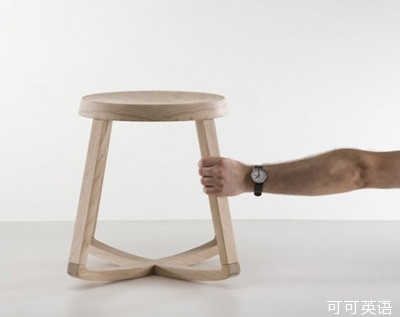A wobbly chair is more than just annoying. Believe it or not, it can influence your values, or beliefs about others.
搖晃的椅子不僅僅令人煩惱。不管你相信與否,搖晃的椅子還會(huì)改變你的價(jià)值觀,或是你對(duì)別人的看法。
Past studies have shown a link between physical objects and our emotions. Carry a cold drink at a party and you're likely to consider other guests cold and offputting. Hold a warm drink, and you tend to perceive those same people as warm and welcoming.
以往的研究已經(jīng)證明了物理對(duì)象與人類情感之間的聯(lián)系。在聚會(huì)上手拿冷飲,你可能會(huì)覺得其它賓客表現(xiàn)冷淡或者不高興。手拿熱飲,你則傾向于認(rèn)為別人是溫良友好的。

In a new study, subjects sat either on wobbly chairs or stable chairs. While seated, they were asked to gauge the stability of several celebrity relationships, for example, Jay-Z and Beyonce.
在一項(xiàng)新的研究里,要求受試者分別坐在搖晃的和穩(wěn)定的椅子上。就坐之后,要求他們判斷名人的戀情是否會(huì)一直穩(wěn)定,比如說(shuō)杰伊-Z和碧昂絲。
Subjects in wobbly chairs judged the celebs to be more likely to break apart, while those who sat on a solid chair felt the celebrity relationships were also solid and more likely to remain intact. The study is in the journal Psychological Science.
坐在搖晃的椅子上的受試者認(rèn)為那些名人們分手的可能性更大,然而坐在穩(wěn)固的椅子上的受試者則認(rèn)為他們的戀情也很穩(wěn)固,很有可能長(zhǎng)久在一起。本研究成果發(fā)表在《心理科學(xué)》上。
The participants were also asked to prioritize what traits they admire in a romantic partner—things like being trustworthy, reliable or adventurous.
在實(shí)驗(yàn)過(guò)程中也詢問(wèn)了參與者心目中的浪漫伴侶首先要具有什么樣的特質(zhì)——諸如誠(chéng)實(shí),可靠或者具有冒險(xiǎn)精神。
And those perched on wobbly chairs valued stable traits—like reliability—highest. While those in sturdy chairs were less interested in stability, presumably because they felt like they were already firmly grounded.
那些坐在搖晃椅子的受試者最重視穩(wěn)定的特質(zhì),例如可靠。然而坐在堅(jiān)固的椅子上的受試者則對(duì)穩(wěn)定的特質(zhì)不那么感興趣,大概是覺得牢牢植根在一個(gè)地方的感覺并不好吧。
原文譯文屬可可原創(chuàng),未經(jīng)允許請(qǐng)勿轉(zhuǎn)載!












